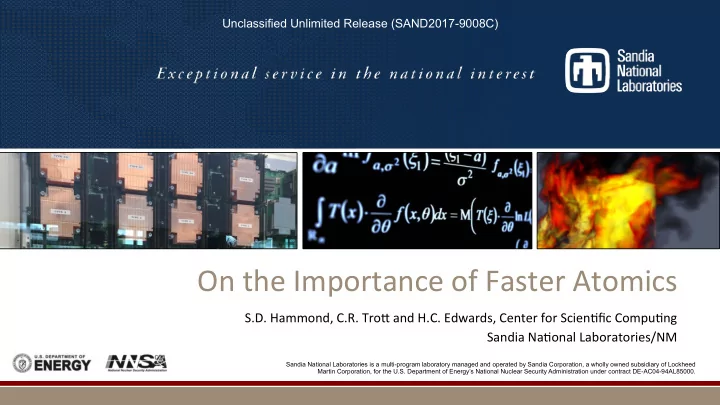

Unclassified Unlimited Release (SAND2017-9008C) On the Importance of Faster Atomics S.D. Hammond, C.R. Tro< and H.C. Edwards, Center for Scien?fic Compu?ng Sandia Na?onal Laboratories/NM Sandia National Laboratories is a multi-program laboratory managed and operated by Sandia Corporation, a wholly owned subsidiary of Lockheed Martin Corporation, for the U.S. Department of Energy’s National Nuclear Security Administration under contract DE-AC04-94AL85000.
Outline § Mo?va?ons and Background § Exposing Atomic Opera?ons in Kokkos § Performance § Conclusions More Information: http://github.com/kokkos
Mo?va?ons § Sandia is heavily focused on making sure that our produc7on applica7on codes will run well on current and future NNSA Advanced Technology System (ATS) § ATS-1 – Trinity (~9,500 dual-socket Haswell, ~9,500 single-socket KNL) § ATS-2 – Sierra (~4,000 POWER9/Volta (2018)) § ATS-3 – Crossroads ? (2020) § For all of these pla?orms we need to have performance portable algorithms and source code § Kokkos for C++ Applica?ons § OpenMP for Fortran
Mo?va?ons § Enabling performance portable, on-node parallel algorithms can be extremely challenging: § Correctness (developer dependent, some tools to help) § Portability (Kokkos helps, but developer work s?ll required) § Performance (heavily developer dependent) § In order to meet our objec7ves to have applica7ons running on these machines as quickly as possible § Need to keep changes to code to a rela?ve minimum § Keep ini?al algorithms similar to prevent significant re-development/re- coding efforts
Atomic Opera?ons § Atomic opera7ons in many ways are an applica7on enabler: § Keep roughly serial algorithms but provide atomic updates to (limited) regions of memory which threads may share § Keep code changes to a rela?vely minimum § Isolate expensive memory updates to where they need to be § Disadvantages in applica7ons: § Floa?ng point rounding differences (floa?ng point ops are not associa?ve) § Varia?on in run?mes if conten?on rates/effects change between runs § Can be expensive § Required for lock-free shared data structures § Queues, hash-maps, ...
Alterna?ves to use of Atomic Opera?ons § Requires new algorithms (e.g. coloring/data replica7on) to be implemented: § Expensive in applica?on developer ?me § Don’t always have enough parallelism to support coloring schemes § Significant code churn § Consumes vast amount of memory if thread count high (data replica?on) § Advantages of alterna7ves are: § Poten?ally higher performance (if we have enough parallelism) § Less performance varia?on between runs because very li<le shared resources § Strong reproducibility of results
Exposing Atomics in C++ § C++11 introduced atomic memory updates into the standard § But ... std::atomic is fairly clunky, requires specific alloca?ons etc . std::atomic<int> data; void updateMe() { data.fetch_add(1, std::memory_order_relaxed); } § We really want something simpler and easier to use § A fix has been proposed for C++20 More Information: http://github.com/kokkos
Exposing Atomics in Kokkos § Don’t require “atomic” types (operate over any type, including non-POD) § Implement a lightweight locking system based on pointer address for types not supported by hardware atomics/CAS int data; void updateMe() { Kokkos::atomic_fetch_add(&data, 1); } § Much simpler to use, can atomically update any value and does not propagate through the type system More Information: http://github.com/kokkos
Performance of Atomic Opera?ons We have developed three rough “categories” of atomic-issue rate and conten7on § levels from some of our ini7al applica7on ports: § Histogram (count values in a bin in parallel and update, integers) § MD (LAMMPS like use of atomic updates to reduce duplicate work,double) § Matrix Assembly (accumulate values into a matrix from an unstructured mesh, double) Run on our current systems: § § GigaUpdates per second § Ra?o of using atomics to standard memory opera?ons (i.e. atomic overhead) § Run in the “best configura?on” (Fastest use of OpenMP/processes, Single Socket for CPU systems) § Ra?o to non-atomic is performance against not using atomics (incorrect answers)
Performance of Atomic Opera?ons Atomics Performance Ratio to Non-Atomics Histogram Histo-Padded MD Assembly Histogram Histo-Padded MD Assembly 100 3 Note – Histogram has GigaUpdates/Sec (log10 Scale) Ratio to Non-Atomic Updates higher contention rate 2.5 10 2 1.5 1 1 0.5 0.1 0 P100 K80 KNL (HBM) KNL (DDR) Haswell POWER8 P100 K80 KNL (HBM) KNL (DDR) Haswell POWER8 Histo-Padded provides padding for cache lines to prevent conflicts (uses more memory)
Discussion § Atomics are clearly very fast on the latest genera?on of NVIDIA Pascal (P100) GPUs due to hardware enablement at the cache (“fire and forget”) § CPUs and historically struggled with fast atomic updates because they add a significant number of addi?onal opera?ons into the instruc?on stream § and .. Cache line sharing, inability of compiler to easily op?mize around § Faster atomics on these plalorms and easier ways to program atomics would make algorithm development for next-genera7on pla?orms easier , reduce programmer burden and improve compiler informa7on for analysis
Discussion § Most algorithms have rela?vely low (but non-zero) conten?on rates § Atomics are really used to enable correctness for the very limited cases there is a shared data conflict § But ... the overhead is high for the opera?ons where no conten?on occurs
Conclusions and Posi?on § Atomic Memory Opera7ons are poten?ally a lightweight programming choice to introduce thread safety and parallelism to exis?ng code § Use atomics to update memory loca?ons you know may have conflicts § C++11 introduced atomics to the language standard but the method of use is less than ideal for minimizing code changes § Fix has been proposed for C++20 § Kokkos provides a lightweight, use anywhere implementa?on for C++ codes Need beRer hardware support to reduce the overheads in our applica7ons • More Information: http://github.com/kokkos
Recommend
More recommend